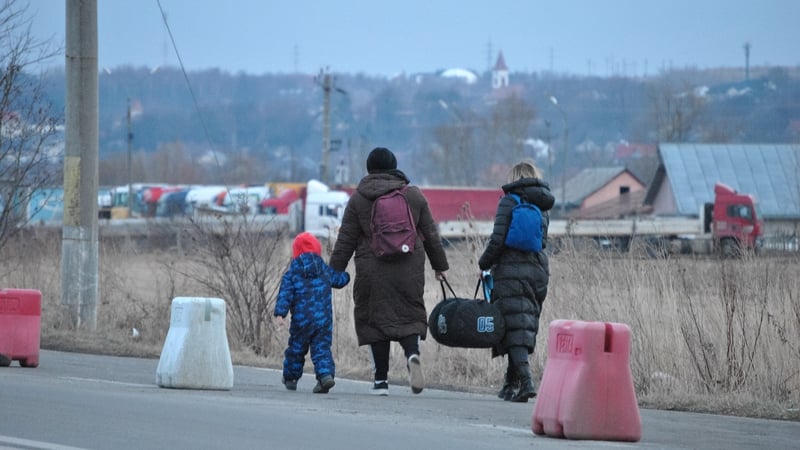
Minister for Justice Helen McEntee has said that 143 Ukrainians have entered Ireland since a visa requirement was waived last Thursday.
However, many of those were already resident in Ireland and "have travelled back to the State for reasons other than escaping the conflict in Ukraine".
The minister told the Dáil that the EU is poised to trigger a previously unused measure to coordinate a mass influx of refugees.
Ms McEntee said that the EU is "likely" to "activate the Temporary Protection Directive" in response to a mass influx on Thursday.
She said the measure, which has not been used before, would simplify the arrivals process.
The Department of Justice has started working on the directive, which would provide an alternative to seeking international protection.
It would provide a year's "temporary residency", which could later be extended to three years.
It would provide "an immediate right to access of the labour market, housing, social welfare, healthcare, education, training and other supports".
The Government's International Protection Accommodation Service will be responsible for finding accommodation for Ukrainian refugees coming to Ireland. Some will be initially housed in hotel accommodation.
Ukrainians to get special refugee status in Ireland - Coveney
The Minister for Foreign Affairs has said Ukrainians coming to Ireland will get special refugee status and will be entitled to work and live here effectively as EU citizens.
Speaking after the Cabinet discussed the Russian invasion, Simon Coveney said the numbers may be so large that accommodation would be needed beyond what the State could provide.
He said the effort could involve Irish families opening up their homes for a temporary period.
Mr Coveney said the EU believes there could be one million refugees and Ireland could end up taking 2%, which would amount to 20,000 people.
However, he cautioned that it was too early to put definitive numbers on it.
The Minister for Housing has said that Ireland will do whatever it can to assist Ukrainian citizens who come here to seek safe harbour.
Darragh O'Brien said that it is not yet clear how many people may arrive here but Ireland will be part of the EU response.
Asked if there was sufficient housing capacity or if direct provision centres would have to be used, Minister O'Brien said it was not clear how many people would be arriving here and it was too early to outline plans.
However, he said that work on this matter was already under way across Government, involving the Minister for Justice and the Minister for Children, Disability, Equality and Integration.
Ireland stands with Ukraine - Varadkar
Tánaiste Leo Varadkar said Ireland stands with its EU partners and with Ukraine in its fight to protect its independence and democracy.
Speaking on RTÉ's News at One, he said Ireland "will take all actions short of military action" to support Ukraine and will provide financial and humanitarian assistance.
He said Ireland will not be sending any weapons to Ukraine as "we are a militarily neutral country".
"We're not politically neutral, but we are neutral in military terms and that means that we don't commit troops for combat in wars and it also means that we don't provide weapons to anyone and that is part of our doctrine of military neutrality," he said.
Mr Varadkar also said that creating a refugee crisis is "part of Putin's plan" to try to destabilise central and eastern Europe.
He said: "We can't let that happen. That's why we have made the decision to allow Ukrainians come to Ireland, to live here, to work here."
Mr Varadkar said the Government is not going to put on a limit on the number of Ukrainians who can come to Ireland.
"It could be thousands, it could be tens of thousands," he said.

إرسال تعليق